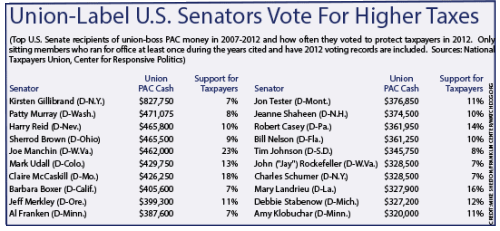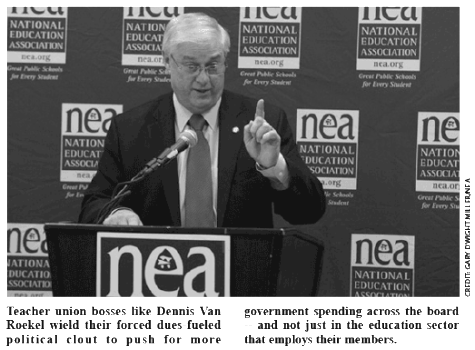Will Team Biden Weaponize Workers’ Pensions?
Big Labor abuse of worker pension and benefit funds as a means of advancing union bosses’ self-aggrandizing policy objectives is a familiar phenomenon.
Top Recipients of Union-Boss Largesse Back Big Government Agenda
(Article first appeared in the September 2014 National Right to Work Committee Newsletter)
This year, according to the Washington, D.C.-based Tax Foundation, Americans will fork over $3.0 trillion in federal taxes and an additional $1.5 trillion in state and local taxes. Taxes at all levels are expected to consume 30.2% of total income.
Even this vast sum of money won’t come close to covering the cost of government expenditures. Consequently, this fiscal year’s federal budget deficit is expected to reach $500 billion. From 2009 to 2012, the federal deficit exceeded $1 trillion every year.
How did American government, which for the better part of our country’s history was relatively modest in scope, get so bloated and intrusive?
Senators Who Got the Most Big Labor Cash Voted With Taxpayers 11% of the Time
Public opinion certainly doesn’t favor the current state of affairs. Indeed, a solid majority of Americans have consistently opposed the so-called “Affordable Care Act” of 2010, the single greatest expansion of government since the 1960’s, ever since it was rammed through Congress four-and-a-half years ago.
A new analysis by the National Institute for Labor Relations Research suggests that the disproportionate political influence wielded by a relative handful of union officials, gained through legislatively-granted coercive power, is perhaps the single most important reason why government has expanded so profusely.
 The analysis by NILRR draws on Federal Election Commission (FEC) reports compiled by the Center for Responsive Politics. The analysis also relies on a nonpartisan assessment of U.S. senators’ and representatives’ voting records made by the National Taxpayers Union (NTU).
The analysis by NILRR draws on Federal Election Commission (FEC) reports compiled by the Center for Responsive Politics. The analysis also relies on a nonpartisan assessment of U.S. senators’ and representatives’ voting records made by the National Taxpayers Union (NTU).
In both the Senate and the House, the politicians receiving the most in reported contributions from Big Labor PACs typically share two characteristics: 1) They favor Big Government, Tax & Spend policies. 2) They face at least potentially close races.
The 20 current senators raking in the most cash from union-boss PACs between 2007 and 2012 received an average 2012 NTU rating of just 11 out of 100, indicating they almost always vote against taxpayers’ interests. (See the chart below for more information.)
Even in the spendthrift Senate of 2012, whose average NTU rating of 40 was 17 points lower than its 1995 peak of 57, members receiving the most reported financial support from Big Labor were roughly a quarter as likely to side with taxpayers as the average member.
And the 10 senators who got the most lavish union PAC contributions won their most recent general-election campaigns with an average vote share of 54%, compared to the Senate average of 60%.
 Vulnerable ‘Tax & Spenders’ Propped up by Union Brass
Vulnerable ‘Tax & Spenders’ Propped up by Union Brass
It’s largely the same story in the U.S. House of Representatives. Among current House members who were already in office in 2012, the 40 who raked in the most from union-boss PACs for their most recent campaigns averaged a measly NTU rating of 19. The House average was 50.
And seven of the top 20 recipients of Big Labor largesse won an average fall 2012 vote share of 55% or less, compared to the House average of 65% for incumbents seeking reelection in contested races.
National Right to Work Committee President Mark Mix commented: “NTU ratings are the fairest and best numerical assessment of an elected official’s record on fiscal issues.”
He explained: “As the NTU points out, the 2012 ratings are based on all 274 House votes and all 127 Senate votes affecting federal taxes, spending, debt, and significant regulations that occurred during the last session of the 112th Congress.
“No one can with any credibility accuse the NTU of ‘cherry picking’ votes to make any elected official look better or worse than he or she deserves.”
Reported Big Labor Contributions Just the Tip of the Iceberg
“That’s why the NTU ratings, combined with Big Labor PAC data and election results data, show clearly how the union political machine targets key races with the intent of forging pro-Big Government Senate and House majorities,” Mr. Mix continued.
“And reported union PAC and ‘Section 527 group’ political expenditures, totaling $106 million in the 2011-2012 election cycle, are far from the predominant means through which Big Labor assists its chosen candidates.
“The same candidates who receive union PAC cash almost always also receive far greater and forced dues-funded unreported Big Labor contributions in the form of partisan phone banks, get-out-the-vote drives, propaganda mailings, and PAC maintenance.
“Such contributions aren’t reported to the Federal Election Commission.
“However, a 2013 NILRR analysis, based on data in reporting forms filed by union officials themselves with the U.S. Labor Department and other federal and state agencies, conservatively estimated that Big Labor spent $1.7 billion on politics and lobbying just over the course of 2011 and 2012.
“And the vast majority of this slush fund comes from union dues and fees that workers are forced to pay, or be fired, under federal and state laws.
“In a closely divided Congress, strategically deployed Big Labor forced-dues money is maintaining Tax & Spend politicians’ operational control over the legislative branch of America’s federal government.”
Politicians Who Get the Least Big Labor Support Are Less Free-Spending
The anti-taxpayer impact of the government labor policies that authorize and promote forced unionism is really driven home when one focuses on the records of elected officials who accept little or no money from union bosses.
The 20 current elected senators who got the least PAC support from Big Labor from 2007-2012 received an average of just $8713 apiece. And their mean NTU rating in 2012 was 80, or double the average for the chamber.
In the House, 42 current elected members received no union PAC contributions at all in 2011-2012. Their mean 2012 NTU rating was 79; that’s 29 points higher than the House average of 50.
“Both because the share of public-sector employees who are under union monopoly-bargaining is five times greater than the share of private-sector workers who are unionized, and for ideological reasons, union bosses favor bigger government,” observed Mr. Mix.
“And, over the long haul, bigger government is what we’re getting. The fact is, the problem of excessive taxation and public spending cannot be resolved without first eliminating the coercive federal labor-law provisions that fuel the Big Government lobby.”
Legislation now before Congress, known as the National Right to Work Act, or S.204/H.R.946, would repeal all the provisions in federal labor law that authorize the firing of employees for refusal to pay dues to an unwanted union.
This reform would empower workers to refuse to bankroll the campaigns of Tax & Spend politicians simply by resigning from their union and withholding their dues.
“Exit poll data show that roughly 40% of union members, their spouses, and other adult members of their households regularly vote against the Tax & Spend politicians Big Labor bosses support,” said Mr. Mix.
“Therefore, if enacted, S.204/H.R.946 would force union kingpins to curtail drastically their political activism, or face massive defections of union members.
“To rein in Big Government, it is necessary first to dry up the $1.7 billion forced-dues slush fund that is its breeding ground. That’s one key reason why the Right to Work Committee keeps fighting to secure roll-call votes on forced-dues repeal before this November’s elections.”

Big Labor abuse of worker pension and benefit funds as a means of advancing union bosses’ self-aggrandizing policy objectives is a familiar phenomenon.

Leaked CTU Proposals Won’t Do Anything to Improve Schools’ Poor Performance

What impact does handing a union monopoly power to deal with your employer on matters concerning your pay, benefits, and work rules have on your pay?